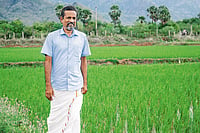An entrepreneur, computer expert, avid artist and mother—Ghazal Alagh, co-founder and chief innovation officer of unicorn Mamaearth, wears many hats with ease. She talks to Outlook Business about her journey and the challenges and gender bias she faced as a young working mother and why women should never give up. Edited excerpts from the interview -
From launching a start-up in 2016, watching it turn into a unicorn and now becoming a Shark Tank judge, how has the journey been?
It has been exhilarating. While it feels great to achieve the unicorn status, it is more about getting accepted by the masses.
Mamaearth was born out of our quest for toxin-free products for our newborn. We realised that in India, there were no certified safe products for children. After months of research and experiments, and working with US-based MADE SAFE that gives certification to non-toxic products, we launched our first set of baby products. We started selling our products through Amazon initially.
We tried offline channels but I think we went offline too soon as the sales didn’t pick up. Two years ago, we went full throttle offline and the response was highly encouraging. I ensure that we continue to listen to customers. In fact, our range of colour cosmetics was launched a month ago after we got 100% positive feedback on a customer survey.
Can you tell us a bit about your background?
I hail from a middle-class Chandigarh family. I was a studious child and was particularly good in mathematics. While my parents wanted me to pursue engineering, I wanted to take up computers instead and enrolled for a Bachelor of Computer Application course in Punjab University. I also took up an internship in NIIT. After I got married to Varun (Alagh), we moved to Manila and that’s when I started painting. He applied to the New York Academy of Art on my behalf and I got a scholarship there. I thought I had found my calling in art but destiny clearly had other plans for me.
How difficult was it to launch a company with a young child around?
The initial months were very exhausting as we were barely sleeping for three-four hours a day. There were times when I had my crying son in one arm while being on the phone for work. Also, as both of us had left our jobs, we couldn’t afford keeping a full-time help and ended up managing most of the things on our own. It was a tough phase but also made me feel that if I can manage all of this, I can do anything in life.
How difficult are things for a woman leader?
We started with a small team of five-six people. As we started growing, we had to segregate roles between Varun and myself. That’s when I realised being a woman leader will not be smooth. I experienced gender bias in my own company when three members quit saying they would not work under me as my experience won’t add value to theirs. I was taken aback and began doubting myself. I had a similar experience with our third-party manufacturing partners who couldn’t accept taking instructions from a woman. Even when we were looking for investors, we used to get questions like “isn’t there a male founder?” Today, the same people share great relations with me.
How does Mamaearth work towards more diversity and inclusion in its workforce?
For every role that we hire, we shortlist an equal number of male and female candidates. I believe everyone deserves a fair chance to prove their mettle. I feel proud to say that we have 51% women in our workforce. We promote a healthy work-life balance, especially for women employees and mothers in the work-from-home scenario particularly. It is part of our culture to offer flexibility and empathy to employees.
What do you have to say about the rise of the woman consumer as a category?
Women have always been the decision-makers as far as buying consumer care products is concerned. Today, men also have specific products to choose from. So, in a family of four, you may have each individual using a different face wash, toothpaste, soap, etc. Women certainly are driving this change and are becoming more aware and difficult to please but they are also coming out strong in terms of having a digital presence.
What advice would you give to budding women entrepreneurs?
Just follow your passion and don’t be bothered about what people are saying. Recently, as a judge on Shark Tank, we had 48% pitches with women founders. That says a lot about how entrepreneurship is budding in this country.































